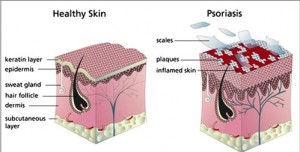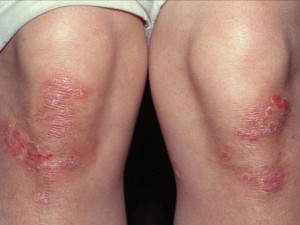-
Heal Your Body: Natural Psoriasis Remedies
Saturday, June 28th, 2025by Andrew Meyers, Naturopath
Do you have dry, cracked skin that bleeds easily? Or perhaps red areas of skin covered with silvery scales? Does your skin burn, itch or feel sore? Are your joints stiff and painful as well? You may be suffering from the skin condition known as psoriasis.
If you have already been diagnosed with psoriasis, you are probably feeling anxious and worried. After all, psoriasis is a skin problem that can cause a lot of pain and discomfort. While not fatal, it is still a serious health problem that affects a person’s quality of life in a major way.
What Causes Psoriasis?
The first step in identifying treatment options is to understand more about this particular skin ailment. Psoriasis typically appears as areas of inflamed red skin that gradually turn into patches of silvery scales.
 It can manifest itself anywhere on the body, although psoriasis is most commonly seen on the knees or elbows. This dermatological condition happens when certain skin cells mature at a faster than normal rate.
It can manifest itself anywhere on the body, although psoriasis is most commonly seen on the knees or elbows. This dermatological condition happens when certain skin cells mature at a faster than normal rate.The true causes of psoriasis are still not fully understood by doctors. Researchers has learned that individuals with parents who suffer from psoriasis are more likely develop the condition. This lends itself to a genetic explanation for the ailment.
Toxic compounds in a person’s diet may also be a catalyst for developing psoriasis. The modern Western diets is full of potential allergens and assorted toxins that can lead to skin problems. A colon cleanse may be helpful in certain cases.
Natural Cures for Psoriasis
It helps to understand the root cause of your psoriasis before choosing a treatment plan. Not all herbal cream and lotions work for everyone. A naturopath may be able to help you understand what elements of your lifestyle may be contributing to an outbreak of psoriasis.
 If you don’t want to take prescription medication for psoriasis, the good news is that there are a number of natural psoriasis remedies available. One of the best natural cures is aloe vera.
If you don’t want to take prescription medication for psoriasis, the good news is that there are a number of natural psoriasis remedies available. One of the best natural cures is aloe vera. This incredible plant has outstanding healing powers. Many psoriasis sufferers find that by applying a small amount of aloe vera gel onto damaged skin daily, their skin cells can recover and return to normal fairly rapidly.
Apple cider vinegar may work for some people to soothe the inflamed skin caused by psoriasis. Try mixing apple cider vinegar with warm water and then applying the solution to the irritated patches of skin.
The healing powers of Turmeric have been known for hundreds of years in India and Pakistan. Using Turmeric as a psoriasis cure is seen by some holistic practitioners as a reliable, safe alternative to topical steroids obtained by prescription.
The Pagano Diet advocates establishing a healthy digestive tract to cure psoriasis. Pagano recommends a diet of 80% fruits and vegetables and 20% starches and protein to restore the digestive tract to its proper balance.
Pagano believes that a build-up of toxicity in the body causes an expulson of toxins through the skin. Therefore a regimen of apple-fasting, herbal teas, colonics and spinal adjustments can help relieve psoriasis.
Other natural products thought to be beneficial in treating psoriasis include oregano, milk thistle and tea tree oil. You may have to try several different remedies in order to find the best natural psoriasis cure for your particular circumstances.
Light Therapy (Phototherapy) for Psoriasis
This form of psoriasis treatment involves exposing the skin to natural or artificial ultraviolet light. The most basic form of phototherapy uses controlled amounts of natural sunlight. Other forms of light therapy include the use of artificial ultraviolet A (UVA) or ultraviolet B (UVB) light, either alone or with other medications.
When exposed to ultraviolet rays in sunlight or artificial light, activated T-cells in the skin die. This slows down skin cell replacement, thereby reducing scaling and inflammation. Consult with a physician about the safest way to use natural sunlight for psoriasis treatment.
Controlled doses of UVB light from an artificial light source may help to mitigate mild to moderate psoriasis symptoms. UVB phototherapy, also known as broadband UVB, can be helpful in treating single patches of psoriasis, as well as psoriasis that has not responded to topical treatments. The short-term side effects of UVB exposure may include redness, itching and dry skin.
A newer type of psoriasis treatment called narrowband UVB therapy is often more effective than broadband UVB treatment. Narrowband UVB is usually administered twice-weekly until the skin improves. From then on, maintenance may require only once-weekly sessions. A word of warning: Narrowband UVB therapy can cause more severe and longer-lasting burns.
A form of light therapy called Excimer laser is used for mild to moderate psoriasis. A controlled beam of UVB light of a specific wavelength is directed onto the psoriasis areas to control scaling and inflammation. Healthy skin surrounding the psoriasis patches is not harmed in the process.
Excimer laser therapy requires fewer sessions than traditional phototherapy due to the use of more powerful UVB light. Side effects of the Excimer laser may include redness and blistering.
Similar to the Excimer laser, the pulsed dye laser uses a different form of light to destroy the microscopic blood vessels that lead to psoriasis. Side effects of the pulsed dye laser may include bruising for up to 10 days after treatment. There is also a slight risk of scarring.
(published March 15, 2012)


